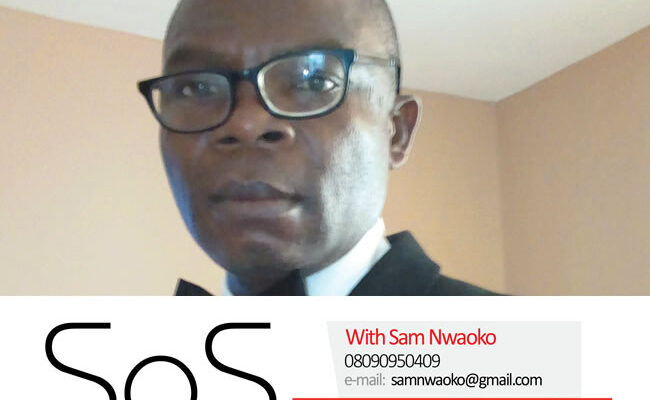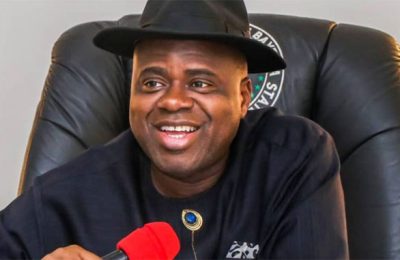

Nigeria, the type which is the ordinary citizen’s dream is now a proven tedious work. It is a work in view but at the same time, one which is perpetually onerous and at the same time grindingly slow. Our country can be likened to a permanent construction site on all fronts of human development considerations. However, going by the pace and pattern of the work, one can clearly see the term, ‘slow men at work’ come alive. It might be deliberate, going by the steady mountainous efforts made by those in charge of the country to keep this misnomer so. This could also be a well-designed web in which the majority of Nigerians of no power have been caught. From whatever dimension this is viewed, it is a pointer to slow men at work.
The expression, ‘slow men at work’ became the common description of a section of government workers some years ago. These formerly ubiquitous government workers were of the highly-visible PWD – Public Works Department – of the ordinarily very important Ministry of Works. They were usually found on the roads – main roads they were called back then – repairing the urban roads and also making minor corrections to the township roads where such was needed. In Nigeria, a few years ago, when the country still had men and women referred to as ‘civil servants’, roads more often than not, were frequently repaired. We saw this act much more than we hear about it now. While they did their work, the PWD workers would put a sign that read: “Slow, men at work.” It was highly necessary and desirable so as to prevent some (although rare) okada-like motorists from running over them.
With time, Nigerians saw that the public service men were annoyingly slothful and caused traffic bottlenecks around towns and cities. The road repair workers were slow and lethargic and people brought a new tinge to the PWD road sign. Nigerians reacted to the slothfulness and apathy that increasingly came upon the PWD people while working on the urban roads. They found a convenient way of expressing their frustration. Thus, they craftily removed the comma in the road inscription “Slow, Men At Work” and thereby changed the meaning and message of the road sign. Even in some states where the sign read “Slow Down: Men at Work”, Nigerians with equal level of annoyance as others still removed the punctuation to alter the meaning so as to show how slow the work was. It was the same feeling all around the country back then. It is still the same feeling today.

The message, ‘slow down, men at work’ remains the same from the builders of Nigeria, but Nigerians read their own meanings to what they are saying and doing. The widespread belief among the citizens is that there are ‘slow men at work’ deliberately delaying the emancipation of the country from decipherable socio-political ills and oppression. These powers are the puppeteers slowing down the attainment of an egalitarian Nigeria. This brings into vivid colours the frustration of millions of Nigerians, and also defines their desire to do something about the obviously debilitating and frustrating race towards a proud Nigeria.
The metaphor of ‘slow men at work’ was one of the factors that fired the voting pattern in last Saturday’s presidential election in Nigeria. Millions of young and first time voters took part in the polls. They said their participation was hinged on the fact that the country’s Independent National Electoral Commission (INEC) repeatedly promised technological innovations to improve the conduct of the elections and their outcome. These younger Nigerians had negative mindset about elections in Nigeria. They had preconceived thoughts about how institutions in the country are under the control of certain parochial powers rather than the Constitution and the laws that established them. These young Nigerians have heard things about the judiciary in the build-up to the last elections. Young Nigerians have had experiences, physical and psychological, with the Nigeria Police. Some of their encounters with the police came to a head with the widespread #EndSars protests that rocked Nigeria in 2020. These same younger Nigerians were dragged through the mud for their concentration on TV reality shows that usually easily amass tens of millions of votes in many cases.
They believed INEC and came out to prove that all their energy was not on only some frivolous causes and that they can bring the same energy to matters of serious national concern. They proved that they are not all lost to TV frivolity and that the future of the country is as important as theirs. Young Nigerians didn’t flinch from INEC and also suppressed their doubts of the possible shenanigans of the ‘slow down men’. They kept their side of the bargain, voted in their numbers and stood by their votes. They waited for the umpire to keep his promise, and expected INEC to treat the poll results as he had promised.

A common saying in parts of Igboland about virtue is usually attributed to Omenuko. The anecdote comes when there are talks or debates around agreements, settled matters or negotiated deals. In straightforward terms, it tugs at people to remind them of the existence of integrity, morality, honesty, social justice and all such related virtues. These virtues are the stuffing by which the sagely character: Omenuko is known. The charge by Omenuko is: Uka a kàrà àkà, isi ka-eji ekwe ya. A crude transliteration from the Igbo language come to: “Through nods we understand that a matter has been settled.” This virtue of respecting and keeping agreements is the forte of Omenuko, an imaginary character in a book with the same title written by the legendary Pita Nwana. The 1933 novel is one of the first Igbo language texts we came across as young school folks back in the days. INEC crudely violated its own arrangement, raped the trust of Nigerians and is unabashed about this. But, “when your ears hear one thing and your eyes see another”, what do you do? The moralist who owns that thought, Frank Sonnenberg, advises thus: “Use your brain.”

Some young Nigerians interviewed by the BBC were moved to tears because they felt that the election was manipulated beyond their imagination. One of them said since she was a child, she had been hearing about election rigging and manipulation, but that experiencing it in the scale which she said she saw, was heartbreaking. People in the category of that young lady and the other interview subject might not just be discouraged in the Nigerian electoral process; they might never trust Nigerian institutions again when they make promises to them.
What would become of our electoral process going forward? Reports are that the turnout of voters was in the region of 28 percent. That is still abysmal especially when the fact that the voter’s register has not been cleaned since 2011. Then, what exactly is the number of registered eligible voters in Nigeria? The confidence of new voters has been eroded if not killed by the under-performance of the electoral body. Haven’t we lost our younger ones? Nigeria’s emerging worries are piling. Only sincere audit of the entire electoral processes and immediate confidence-building engagements by the necessary stakeholders might begin to salvage the ugly situation. But for now, we seem to have flung away the expected new Nigeria post-Buhari.
READ ALSO FROM NIGERIAN TRIBUNE








